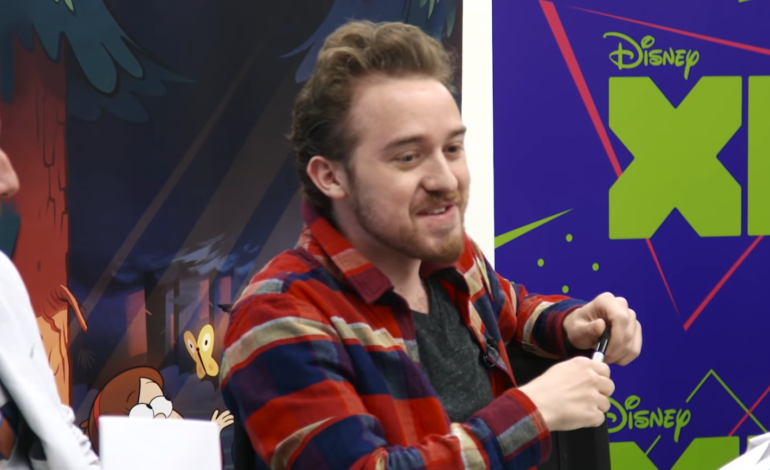

Shortly after Pride Month kicked off last week, Disney’s Twitter posted a seemingly innocuous image to celebrate the occasion, which prompted a less-than-pleased response from Gravity Falls creator Alex Hirsch (Fish Hooks, The Owl House). The Disney employee retweeted the company’s post, calling them out for pushing him to “cut the gay scene[s]” from Gravity Falls and only embracing the LGBTQIA+ community when it fiscally benefits them, via Twitter.
To any creative at Disney TV, Feature, Publishing or Streaming: please mercilessly spam your execs with “there’s room for everyone under the rainbow” next time they tell you to “please revise” your LGBTQ+ character for “not being Disney appropriate”
— Alex Hirsch (@_AlexHirsch) June 2, 2021
Hirsch’s criticism echoes the larger arguments made against “rainbow capitalism,” a phenomenon in which companies symbolically cash-in on the Pride movement throughout the month of June, despite not advocating – or in some cases, actively harming – the queer community overall, via CNN. Disney itself has earned repeated criticism regarding their sparse representation, which can be traced directly to their overseas financial marketability. Onward provides one example, as it features Lena Waithe (Master of None, The Chi) as a queer character within the confines of “a brief line that confirmed a character’s sexuality as a lesbian,” a line that was able to be “censored” so that Disney could market the film in Russia, via Rappler.
Background moments in Frozen 2, the live action Beauty and the Beast and Star Wars: Episode IX – The Rise of Skywalker provide blink-and-you-miss it moments with queer or queer-coded characters that “cater to [Disney’s] large box-office markets in Russia and China” (Rappler). In a recent Vanity Fair interview, Kelly Marie Tran (Star Wars: Episode VIII – The Last Jedi, Sorry for Your Loss) speculated that her character Raya, from Raya and the Last Dragon, was a lesbian. If this had been confirmed in the film’s canon, it would have made Raya the first openly lesbian Disney princess. However, Disney’s track record with mainstream titles serves as an indication that it will still be many years before the company canonically delivers a LGBTQIA+ princess, opting instead to leave characters like Elsa and Raya’s sexualities up to the audiences interpretation.
Though the 2012 Disney XD series Gravity Falls was a smaller scale production than the big budget films that skimped on explicitly queer characters and stories for international marketability, Hirsch still ran into similar struggles when trying to include representation in his series. While bumbling Gravity Falls’ law enforcement officers, Sheriff Blubs and Deputy Durland, had a queer-coded relationship throughout the series, their romance was not confirmed until the show’s final episode. Additionally, a Gravity Falls script that featured two elderly women falling in love earned Hirsch a network note from Disney that deemed the scenes “inappropriate for the channel,” and encouraged him to make the couple straight instead, via Out.
Notes of this nature are likely the reason why Hirsch went out of his way to point out the disingenuity he felt when seeing Disney’s Pride Month post, though he has praised the company for the steps towards progress it has made in the past. When The Owl House debuted as Disney’s first animated series with a bisexual lead, Hirsch took to Twitter to applaud the network for embracing a representative show of this nature on its roster. Even then, Hirsch noted how a series such as The Owl House may not have been possible just a few years earlier, based on the feedback the company had given him on Gravity Falls.
In 2012 the Disney censor note on this image would have been:
“inappropriate for channel, please revise, call to discuss” (to avoid a paper trail)Now in 2020- there’s no note at all.
Props where props are due! This time, Disney- you did good. pic.twitter.com/HLDux1jNUk
— Alex Hirsch (@_AlexHirsch) August 9, 2020
While Hirsch called Disney out based on his personal experiences trying to fight for queer representation in the past, he has equally praised and uplifted the little victories that the LGBTQIA+ community has been able to earn under the Disney umbrella. Today, Disney+ confirmed Loki’s gender-fluidity would be apart of the eponymous Marvel Studios series. As the Marvel Cinematic Universe reaches a more mainstream audience on the platform than show’s such as Gravity Falls or The Owl House, the handling of Loki’s sexuality and gender-identity on Loki show may serve a litmus test to see if the company intends to embrace the mantra “there’s room for everyone under the rainbow” (Twitter).
